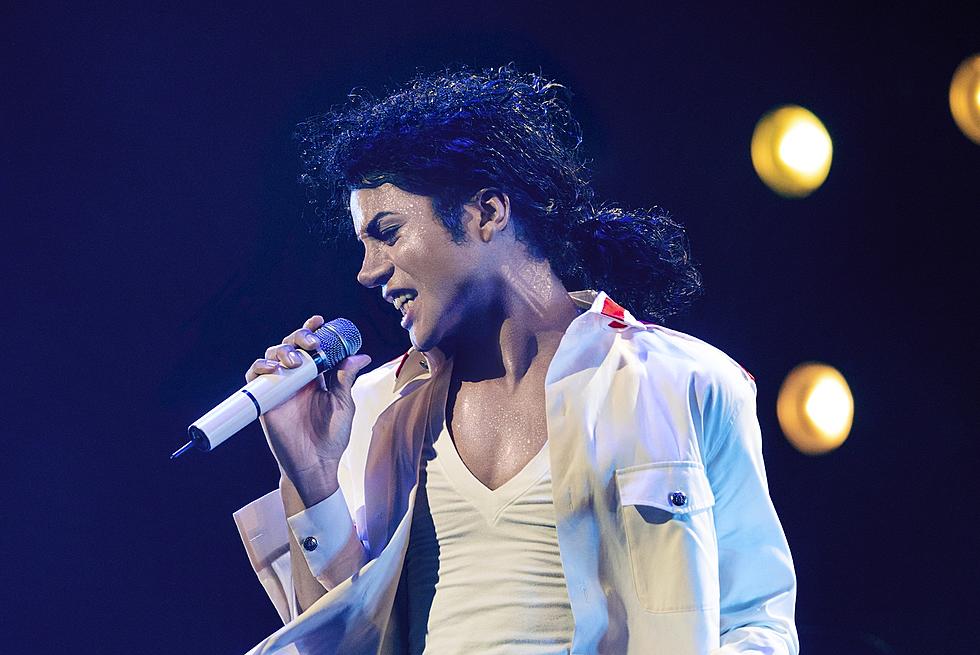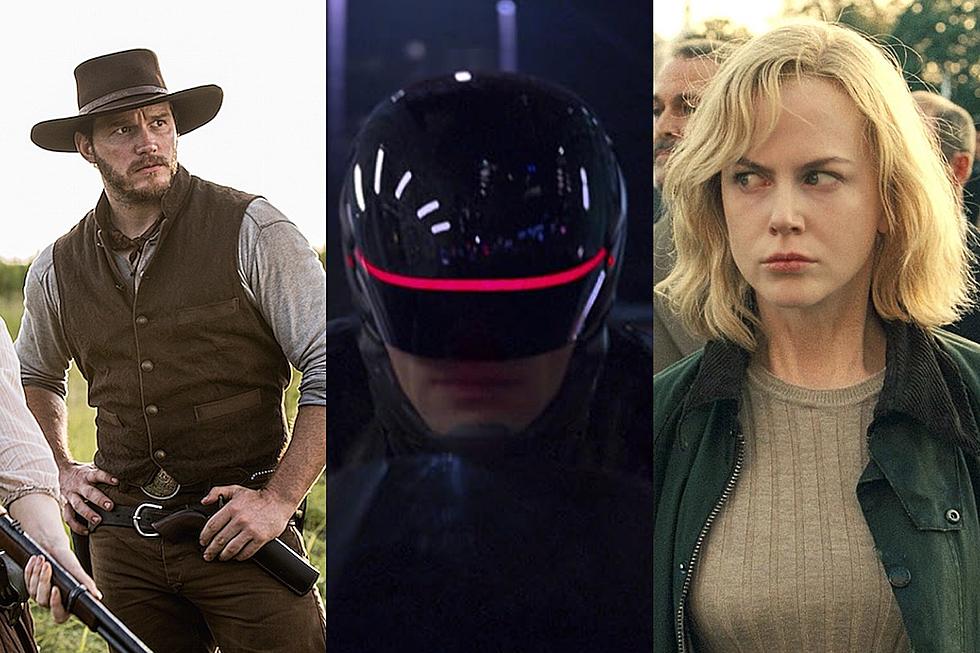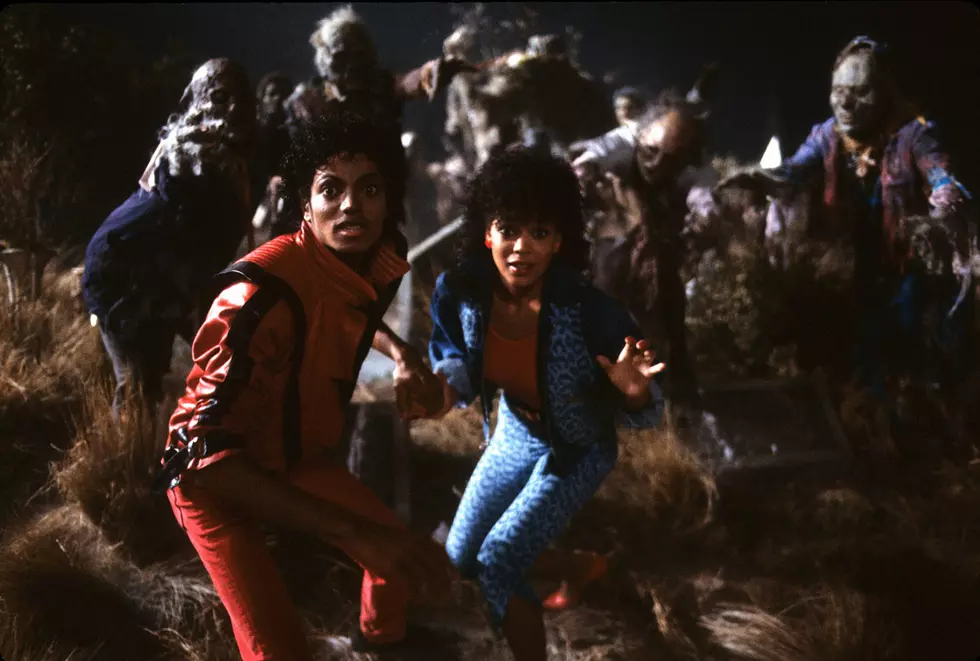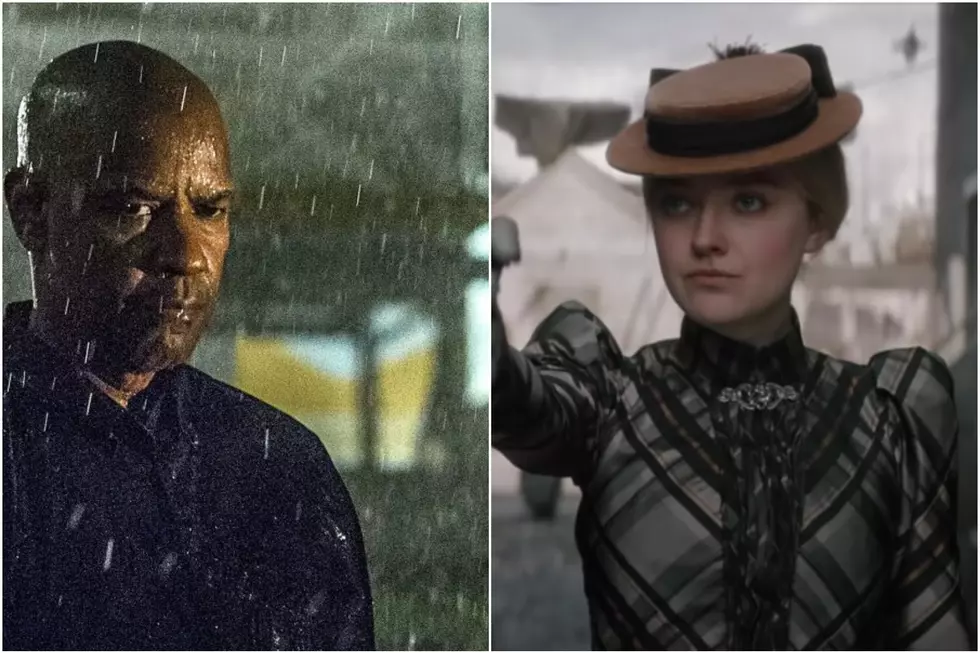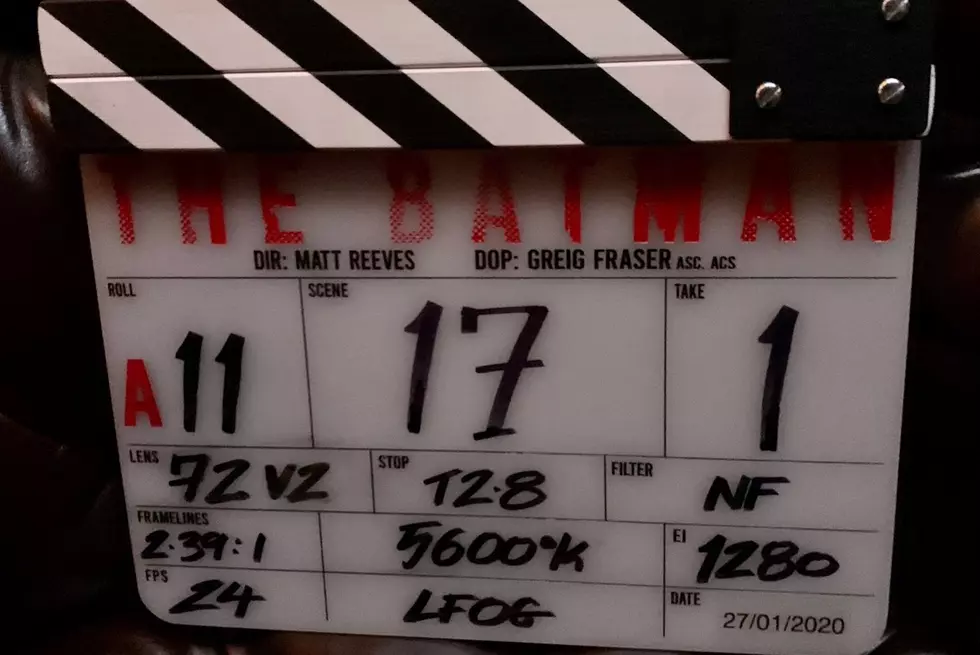
Peter Sarsgaard on ‘The Magnificent Seven,’ Playing Bobby Kennedy in ‘Jackie,’ and One Role He’d Never Play
Peter Sarsgaard often plays guys you can’t help but hate. From Boys Don’t Cry to An Education to Lovelace, Sarsagaard has mastered the art of playing seedy jerks who pray on the weaknesses of others. In Antoine Fuqua’s The Magnificent Seven, Sarsgaard takes on the role of the bad guy once more.
In the Western remake, Sarasgaard’s Bartholomew Bogue is the ruthless leader of a gang that seizes the small mining town Rose Creek. He storms into a Sunday church prayer to terrorize the townsfolk, murder anyone in his path, and steal the land from its rightful owners. Soon after, Haley Bennett’s Emma Cullen decides to fight back by hiring a group of gunslingers to take down Bogue and his men.
I caught up with Sarsgaard at the Toronto International Film Festival ahead of the film’s world premiere to talk about playing a villain in a studio movie, a role that featured a lot of improv and an acting trick he learned from Nick Nolte. Sarsgaard also told me about playing Bobby Kennedy in Pablo Larraín’s Jackie, why he hates remakes (this one is an exception), and the one role he refuses to play.
You play Bartholomew Bogue, which is a pretty fantastic name for a villain.
Yeah, we needed a big name for a big-sized personality.
What was it like creating that character?
I just opened my mouth and was as astonished of what came out as anyone else. You sort of just start taking steps in a certain direction. That’s one of the really nice things about acting, it’s that as a writer – I’m also a writer – you start writing and you read what you wrote yesterday and you throw it away. As an actor, you just have to keep walking in a direction. Whatever you made yesterday is going to be combined with what you make today, with what you make three months from now. So you just start dealing with what’s there.
I remember doing this scene in the church [in Magnificent Seven]. I came in and said I really feel like I need a kid up on stage with me and I want to put his hand in this jar. [Fuqua] went, “Okay, we’ll have to come back tomorrow to do that because we don’t have a kid that can sit on this side in the audience and then on your coverage stand[ing] next to you because that would be too big of a work day and I want to shoot this all in one day. So we’ll shoot just him in the audience right now and then we’ll come back and shoot him on stage.” So he rearranged filming to be able to do something like that.
That’s real collaboration. That’s coming up with something on the day. It’s inconvenient. Another time he said, “I feel like [your character] should be sick.” We had already shot a little something, and I said, “How sick?” And he said like consumption or something. So you know we just started working on creating, kind of like mucus, a warbly, congested, stifling cough. Sometimes they would spray menthol in my eyes and pretty decent quantities – people use it for crying in movies. I once heard from Nick Nolte, [he] told me this great story about doing Affliction. I said, “When you pull your tooth out, how’d you make it look so real?” And he said, “Menthol.” So I went to the menthol stick a couple of times in this movie. Especially close-ups where it would look like I was ... roomy is the word I’m looking for.
I didn’t think about doing that a month beforehand. You’re just sort of doing it as you go along and it’s rare to work on a movie this big where someone’s willing to work in that way. That’s what makes this movie not feel generic. You know everyone’s got a lot of room like that. You can tell that people are improvising even here and there.
Did you improvise a lot?
Oh yeah, yeah. I improvised a fair amount.
Has that been your process your whole career, or did you work towards a method of improv and collaboration?
You work differently depending on who you’re being directed by. You know, I imagine if I were being directed by Stanley Kubrick who was really detail-oriented, I would try to work for Stanley Kubrick. Do you know what I mean? You just get a sense of what they’re trying to create. Some movies have a very precise feel to them. I think if you’re on like a [Ingmar] Bergman movie, and he’s like, “Turn your head a little bit to the left and say the line again,” you would do it. Because you would be like, you’re Bergman, it’s cool. This is going to be awesome. You know, why does everyone in a David Lynch movie talk like they’re in a David Lynch movie? Because they know David Lynch movies. And he just makes it feel a certain way. And you wouldn’t go in there and talk like you were in a Ken Loach movie.
You just adapt to the environment.
You adapt to it. Either based off of the filmmaker’s history. […] With Woody Allen he just creates just really high stakes. And he really is like, it’s opening night, act one, scene one, the camera’s on, you have a feeling he’s going to shoot just one take. This is it. And be loose. He does those two things together. So you’re like, tight and loose at the same time. And so everyone has kind of a phonetic overlapped anxiety-ridden quality.
Do you rely a lot on a director to help you get to that place?
I do. And if they’re not doing it, if they’re a new director I try to either work with them to either find something like that if I’m the lead actor in the movie. Or I just cover my own ass. [Laughs]
This is the first villain you’ve played since Green Lantern. Do you get into a different psychological mindset when you play an evil character?
There’s a younger part of you.
A younger part of you? How so?
Yeah. If you watch – do you remember that [Terrence Malick] movie Tree of Life? There’s a scene in it were a kid throws rocks at a window. There’s that violence of young boys and that they’ll kill a frog. It’s experimenting with hate. I don’t know if it happens with young girls too, but it happened with a group of young boys I was around. You just revel in that and then don’t think too much about like, what it means to kill someone. It’s very easy to kill someone. You shoot them in the heart, and they’ll die. I think it’s easier to distance yourself from the consequences of hate than to think about them.
In a way, this was a lot easier role than playing an antagonist in a movie like Boys Don’t Cry, where [my character] was a man that was filled with bigotry and hate and jealousy and it was making him do something from this very human place. And I actually really liked the guy that I played and I cared for him. [That’s easier] than it is to be in a movie like this and your job is to set up terror that will affect the rest of the movie.
So is it more about the extremes of the evil you’re playing?
Yeah. I don’t even think I care about my own life. I’m not doing it for the money. I’m not doing it for anything other than the lust for violence and misanthropy is the right word, it’s a big word but it’s the right one.
Do you stay in that headspace on set or could you switch it off?
No, because it’s about disassociating. You watch a truly violent person, they are able to kill someone and then have a conversation with you two minutes later. You think of probably some of the most serious drug lords that have been around, El Chapo or Escobar, the number of lives that they’ve took. They didn’t sit and worry about each one. One life is a tragedy and a thousand is a statistic, as Stalin says. [Laughs]
I feel like you’d play a great serial killer.
Yeah, I could definitely do – but the thing with playing someone who’s a great serial killer, someone who’s a powerful serial killer, is to not revel in the consequences that much. It’s easy. It’s not difficult. You don’t need to stir yourself up. You don’t need to create the hate. In this character I think a lot of the time he sort of enjoys the feeling of hating someone.
I’m also playing to a pretty wide audience, it’s a villain in a PG-13 movie. I’m limited in terms of what I can actually physically do or say. I needed to imply an enormous amount of hate and terror. So that meant playing someone who experienced a little bit more than if you’re watching me in an R-rated movie I would slit someone’s throat, disembowel them or do something awful to them and then walk out and talk totally normal to someone and that would be terrifying, because you had seen me do something. In this I needed to always be creating. I was aware that a 15-year-old could be watching this movie and that the violence needed to be suitable for them.
You’re also in Jackie, which premieres at the festival.
Yeah, I play Bobby Kennedy.
What was it like to play him?
Scary. In terms of how he talks, I actually think I have a not dissimilar way of speaking and his accent is so interesting that you kind of can’t do it wrong because he does it differently all the time. He’s a combination of New York, Boston, and a little bit English because he listened to a lot of Winston Churchill on records when he was a kid. I think he was always encouraged to speak properly. [Does a Robert Kennedy impression]. He goes to that. You hear he and his brother talking and it’s kind of a banter about them. He has a soft “S” like I do. We have similarities. I really, really love him as a political figure, even though he worked for McCarthy, I see someone who had real noble beliefs, who was articulate in a way that’s uncommon but was one of the youngest kids in a huge family with very distant older brother that he was in service of.
I had a great deal of love for him and I hope that comes across in the movie. I didn’t like playing a real person and I never will, and that’s what I told Pablo [Larraín] when he offered it to me. “Well, I’m not gonna play him.” But of course I do. I even have false teeth in part of the movie. I thought it was interesting that this very handsome guy had very strange teeth. There’s something very vulnerable about that, about not feeling beautiful compared to your brother. The guy that they got to play my brother in the movie was a very handsome Danish guy who looked just like him and you were like, “Well I’m not like that.” I have no idea what it’s gonna be like. Pablo has the most unusual, inspired way of working. I’ve never worked like that before.
What is it about his method that’s different?
You do scenes in here, say this whole conversation, and then we do it running down a hallway. Then we do it in a closet whispering to each other. He’s changing lines all the time, he’s yelling out something for you to say. You’re saying things that you believe your character would never say but is probably in their heart. So you’re like, “I can’t believe he would ever say this,” and he was like, “It doesn’t matter! He saying it now.” And you’re like, “But it’s Bobby Kennedy! [Laughs] I have to protect the legacy! Holy shit! Brother, because you’re Chilean you don’t know!” I’m a liberal from America, this is one of the titans. I mean, if you hear the speech he gave after Martin Luther King was assassinated from a back of a pickup truck where he told a largely black audience that Martin Luther King had been assassinated, and you almost hear a riot about to start and then he settles them with eloquence. You’re like, this is what’s missing in our lives right now, someone like that.
I know that my portrait will never live up to my real adoration of the guy, that’s just the way it goes. And [the film is] intercut with original footage. I was saying to someone the other day, I played a quadriplegic in a movie once shot here in Toronto like 20 years ago. In one scene they put actual quadriplegics in the scene with me and I was like, “You just highlighted the fact that I’m not a quadriplegic. Look at these people. There’s no way, physically, mentally to know, to live that. I’m approximating that, I’m an actor. I’m trying with empathy and experience to get there but I’m never gonna be there.” I felt the same way thinking, ah, the actual Bobby Kennedy is going to be in this movie, and I’m standing here playing Bobby Kennedy. Ahhh! But I think a little bravery has helped me a lot in my career. I didn’t want to be the guy in An Education. I didn’t want to be a lot of the characters that I’ve played.
Do you take those roles knowing you don’t want to be them as a sort of challenge?
It’s not flattering to be the guy in An Education. I gained 10 pounds and wore a suit two sized too small and was flirting with a girl that looks like I don’t belong with. Then there’s another guy in the movie that she looks appropriate for and I’m not a guy who’s truthful, I’m playing somebody – liars are the easiest people to malign. A liar is the lowest of the low for most people. The only characters that I won’t, that I don’t think I can defend are pedophiles.
So you’d never play one?
I won’t play a pedophile. That’s also because I would have to act with a child that I was pretending to lust after, so I’m not willing to do that either. I’ve often told my publicist and agents and everybody, they think it’s a joke. I really do mean it, I can’t defend them.
Is there any type of role that you haven’t played yet that you really want to?
A lover. A luster. […] I would love it if the conflict were just an internal conflict in a relationship. Actually you know what’s a great love story, I think it’s Urban Cowboy. That’s a three-way love story and she’s got the abusive guy and the guy who’s not totally good either, John Travolta in that movie. Debra Winger, I mean if they can make something like that, like Tender Mercies. One of those types of movies.
Maybe it will get a remake.
Oh f---! Let’s not remake the movies that were good in the first place. The thing I think about Magnificent Seven is it was a pop movie that appealed to the pop culture of that time. You go back and watch it, it wouldn’t be a big hit if they put it out today. It doesn’t have the same references, Yul Brynner and Steve McQueen and all the rest. So now we’ve put out one that has something to do with the times we live in right now. Both politically, but also culturally and also in terms of what we find entertaining or funny. Those are all temporary things and so, I have big hopes for this movie in terms of that.
More From ScreenCrush
